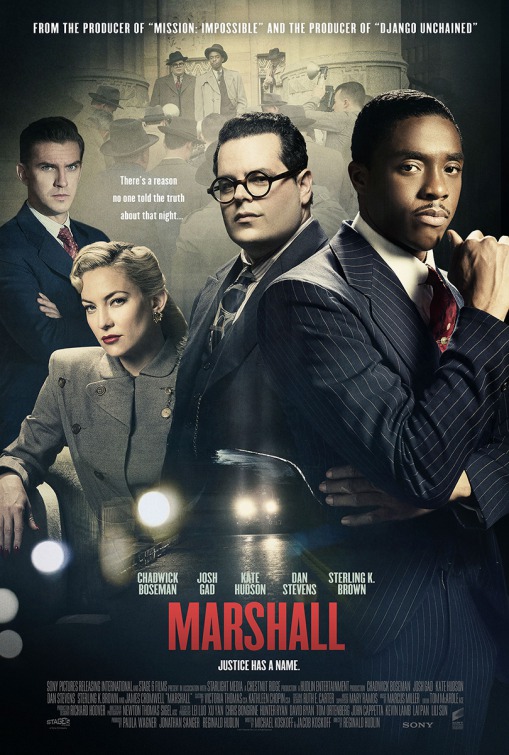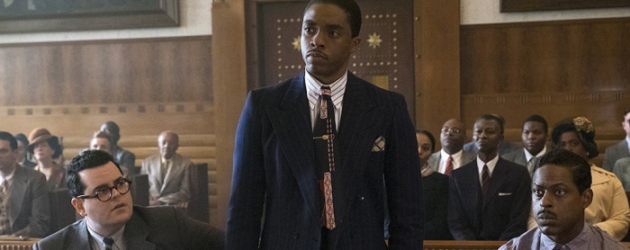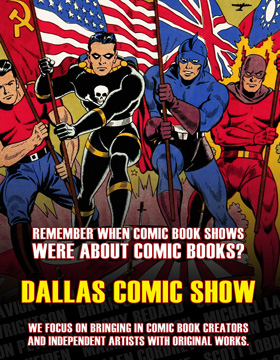
MARSHALL tells the story of one of the early cases of Thurgood Marshall, the first African-American to ever serve on the Supreme Court of the United States. This particular story takes place in 1941 when racism and bigotry were rife in this country. The case in question is The State of Connecticut vs. Joseph Spell, wherein Spell (a black man) is accused of raping his white employer’s wife. Chadwick Boseman stars as the eponymous Thurgood Marshall.
Boseman’s performance as the title role is a likable one but the story falls into the same trap that befalls many historical dramas in that it is a fairly one-note performance. Marshall has an almost messianic quality about him. He always has the answers, always has a trick up his sleeve, and immediately sees through any deception. This makes a strong and charismatic performance, but there is a certain dehumanizing effect because of Marshall’s lack of dimension. There are only a few moments of emotional weight within the story and these beats are very brief.
Boseman does however bring across a youthful energy in his performance, which really invigorates the production as a whole. This is not the sagely and reserved personality that one might expect of a famous judge such as Thurgood Marshall. Boseman’s performance is that of a fighter, and he exudes the confidence and uncompromising attitude that befits that fighting spirit.
Marshall’s partner in the defense of Spell is local lawyer Sam Friedman, played by Josh Gad. Friedman is resolute in his unwillingness to get involved with the case, but circumstances prevent him from leaving the case for Marshall to handle alone. Their relationship becomes that of puppet and puppeteer because of this, with Marshall giving Friedman subtle instructions during the court proceedings and putting him through rigorous training when out of the courtroom.
Boseman and Gad have good chemistry in their roles as the two defense attorneys, but their arc is fairly predictable. They don’t get along at first, tensions boil until an eruption, but then they get it together and form a powerful partnership. Their partnership is made all the more important due to various circumstances placed upon them. Marshall is prohibited from speaking in the courtroom due to his status as an outside lawyer, and Friedman (while successful as civil lawyer) is completely unfamiliar with criminal casework. They depend heavily on each other and form a strong bond by the end of the story.
Aside from the two lead roles there are no notable performances with the exception of Sterling K. Brown as Joseph Spell. Despite being the center of the proceedings within the film, he is not given much time on screen. His performance is very powerful as the defendant in this volatile court case. The villains of the movie are the heartless prosecution lawyers who sneer at the lead characters and who are portrayed as almost cartoonishly evil. They have no depth or personality beyond their bigotry.
An interesting choice by the filmmakers is that it is a relatively early case in Marshall’s career. This case happened in 1941 and Marshall’s most widely known case as a lawyer was Brown vs. The Board of Education of Topeka in 1951. That particular case is well-known as the case that helped set the precedent for ending discrimination in public schools in the United States. This decision works in the favor of the production for a multitude of reasons. Instead of giving a broad overview of Marshall’s life, the focus is on a singular case. This serves to keep the film fresh, tight and self-contained, because the audience would likely not be as familiar with this case as they would be with Marshall’s more famous ones. This was truly a smart decision on the part of the filmmakers.
I cannot comment too much on the accuracy of this portrayal because I am mostly unfamiliar with how the case played out in reality. Brief research leads me to believe that the film hits the mark fairly well. There are several clever methods that Marshall and Friedman make use of during the case which match records of actual events that took place in the courtroom. That being said, I do not think the filmmakers intended this to be educational or completely accurate, I believe they simply wanted to tell a story. They have succeeded in telling that story in a powerful way and has made for a very good film. MARSHALL earns a solid 4/5.








